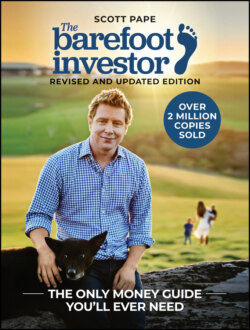Читать книгу The Barefoot Investor - Scott Pape - Страница 13
Put your foot down
ОглавлениеThe first person you need to fight is yourself.
Picture what you looked like in your high-school photo.
If you were anything like me, you were awkward, gangly and so ashamed of your braces you didn't open your mouth (though you now thank Christ your old man made you get them).
Even though we're now older, possibly partnered up, and have visible veins on our legs and hair growing out of our ears, deep down we're all still only a few shades from that insecure little kid.
But here's the important part: that kid in the picture formed a lot of beliefs and assumptions about who you are and what you're capable of.
And the problem is that decades roll by and life gets busy, and if no-one challenges the negative ‘scripts’ that auto-play in your head whenever you stuff something up or get rejected, those teenage beliefs bed down, compound and become ingrained — they become who you are.
And they slowly but surely eat away at your self-confidence, keeping you locked in a job you've lost interest in, relationships you've outgrown and a financial state that stops you from experiencing life on your terms.
Believe me, as a finance guy, I've seen it thousands of times.
It's like a mate of mine who's an awesome mechanic. I've watched him turn his head to the side and listen as a car pulls up, and casually tell the driver, ‘Time to tighten your fan-belt cobber … and get them to change the oil while they're at it’. To me, he's like the Nostradamus of cars. For him, it's nothing special; it's just what he does: after years of doing something day in, day out, patterns emerge that are easy to pick.
It's the same with my job. The best way to get to the guts of someone's financial situation (other than poring over their financials) is to turn my head, and listen intently as they describe their situation.
Patterns always emerge. Here are some of the scripts that may be turning over in your financial fanbelt right now.
Here's you: I'm not that smart with money.
Here's me: No-one is born ‘smart with money’. It's a learnt skill — like driving — and it has more to do with your behaviour than your brains. This explains why I know a lot of so-called financial experts who don't have two bob to rub together — and why I also know wealthy people who never finished high school. You don't need to be a financial expert to win with money. It's much more important to start than it is to be smart. And remember: you're in luck — you've got me as your independent tour guide to financial independence.
Here's you: I don't earn enough.
Here's me: It's not about what you earn, but what you save. I've had clients who were cleaners their entire lives, who never earned more than the minimum wage, but used compound interest to build a million-dollar portfolio.
Here's you: I've left it too late … I should have saved more when I was younger.
Here's me: Stop for a second and tell me what age you'll be when you die.
Go on … answer that.
I'll wait.
Most people don't think about their long-term future, but nearly everyone has a specific age in mind when they'll die.
Next, subtract your current age from that number.
Now you have a ballpark figure for how many years you've got left on the planet.
The question is: What are you going to do with them?
You can continue living in the past, beating yourself up about the money mistakes you made when you were younger, telling yourself you've left it too late … or you can rise up and make yourself proud.
Here's you: The economy sucks.
Here's me: More millionaires were created in the Great Depression than at any other time. Author and physician Peter Diamandis found that in the past century the average lifespan has doubled, while the average income has tripled. Food is 10 times cheaper, electricity is 20 times cheaper, transport is 100 times cheaper and communication is 1000 times cheaper. These are the good old days.
